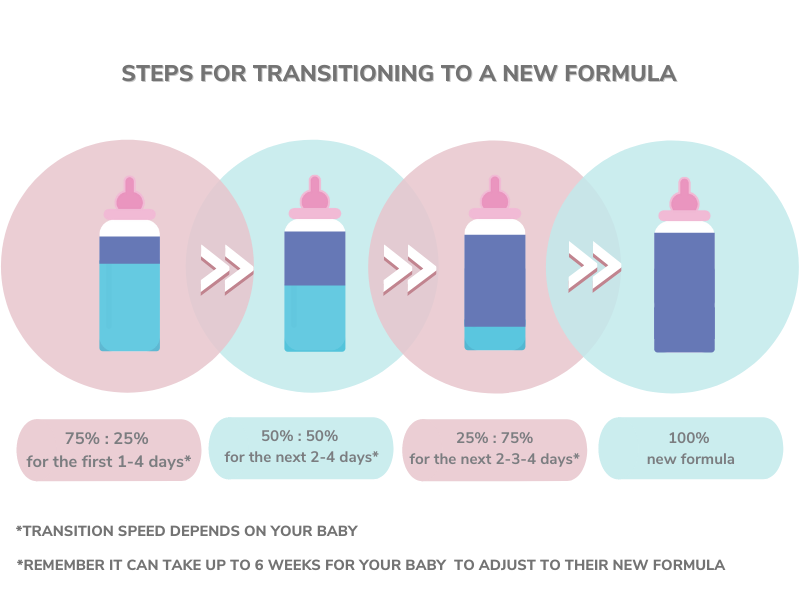Switching your baby’s formula can feel like a big decision, but how do you know what to expect during the transition? One of the most common concerns parents have is how long does it take for baby to adjust to formula change. Every baby reacts differently—some adjust quickly, while others may experience temporary digestive changes, fussiness, or changes in stool. But how long should you wait before deciding if the new formula is the right fit?
In this guide, we’ll walk you through the formula transition process, including signs that your baby is adjusting well, how to pace the switch, and when to consult a pediatrician if concerns arise. You’ll also learn about potential digestive changes, the role of diet, and the time frame for a smooth adjustment. By the end of this article, you’ll feel confident in helping your little one transition to a new formula with as much comfort and ease as possible. Keep reading to make the process stress-free for both you and your baby!

Why Formula Changes Are Necessary
There are various reasons parents might need to change their baby’s formula. A baby’s nutritional needs can shift over time due to growth, health conditions, or changes in breastfeeding routines. Some common reasons for switching formulas include allergies or intolerances to certain ingredients, a doctor’s recommendation due to specific health issues, or simply trying to find a formula that agrees with the baby’s stomach. Parents might also opt for a different formula if they want to try a brand that promises certain benefits or if they need to adapt to a different feeding situation. Regardless of the reason, it’s crucial to approach any change carefully to ensure the transition works smoothly.
How Long Does It Take for Baby to Adjust to Formula Change?
The adjustment period for babies switching formulas varies significantly. Generally, the timeline can range from a few days to several weeks. Multiple factors play into this timeline, including the baby’s age, the type of formula being introduced, & the reason for the change. If a baby has been on a particular formula for a long time, they may need additional time to adjust simply due to habit. Conversely, if the baby takes to the new formula quickly, the adjustment period could be much shorter. It’s important to monitor the baby during this transition, as any signs of discomfort or distress should be addressed immediately.
Signs Your Baby is Adjusting Well
It’s essential to be aware of how to gauge whether your baby is adjusting well after a formula change. Here are some common indicators:
- No significant changes in feeding patterns: A stable feed amount suggests comfort with the formula.
- Consistent bowel movements are an excellent sign that digestion is proceeding well.
- A happy demeanor post-feeding indicates they feel satisfied with the new taste & texture.
- Normal weight gain is crucial; you want to see that your baby continues to thrive & grow.
Pacing the Transition
To ease the baby into the new formula, consider introducing the change gradually. This approach can help reduce digestive upset. Instead of switching completely from one feed to another in one day, you might want to start by mixing the two formulas. For instance, begin with a mixture of 25% new formula & 75% old formula. Over a week or so, you can gradually increase the amount of the new formula while decreasing the old. This method allows your baby’s system to adapt slowly & can help minimize any adverse reactions.
| Day | Old Formula (%) | New Formula (%) |
|---|---|---|
| 1 | 75 | 25 |
| 3 | 50 | 50 |
| 5 | 25 | 75 |
| 7 | 0 | 100 |
Monitoring Potential Reactions
After initiating a change in formula, it’s crucial to keep an eye out for potential negative reactions. Some babies might express discomfort through fussiness, which could be linked to gas, colic, or allergies. You should also look for symptoms like diarrhea, constipation, or skin reactions. If any of these symptoms persist for more than a couple of days, or if they seem severe, consult with a pediatrician promptly. It’s vital to ensure your baby is healthy & content with their new feeding regimen.
Consulting Your Pediatrician
Before initiating any formula change, it’s often beneficial to talk to your pediatrician. They can provide valuable personalized advice based on your baby’s health history & growth patterns. They might suggest specific formulas tailored to your baby’s needs, particularly if they have experienced previous allergies or intolerances. In some cases, your pediatrician can also provide guidance on the best strategies for managing the transition to help your baby cope with a new formula smoothly.
Personal Experience of Transition
Reflecting on my own experience with the question of how long does it take for baby to adjust to formula change, I found that my baby took about a week to fully adapt to a new formula. Initially, there were some signs of discomfort, but after slowly introducing the formula & monitoring their reactions, my child began to adjust quite well. It provided reassurance to see my baby gradually become more comfortable within a week, which allowed me to ease the worries I had about the switch.
The Role of Mother’s Diet
If you’re breastfeeding, consider how your diet influences your baby, especially if you’re transitioning from breastfeeding to formula. Elements in the mother’s diet can affect the taste & smell of breast milk, influencing the baby’s acceptance of formula. If you’re switching to formula after breastfeeding, your baby may take time to adapt to the different taste & texture. Ensuring a smooth transition can also involve familiarizing your baby with the formula’s flavor through gradual introduction.
Time Frame for Adjustment
The time frame for adjustment varies widely among infants based on numerous factors. While some babies may only take a few days to acclimate to the new formula, others could take weeks. Important factors include the type of formula used, the reason for switching, & how the baby reacts both physically & emotionally to the change. It’s crucial for parents to be patient & to observe their baby closely during this period. Remember, each baby is unique & may have different needs during this transition.
“How long does it take for baby to adjust to formula change? In some cases, it takes just a few days, but always remains patient & attentive.” – Carmen Runolfsdottir
Common Types of Formulas
As you consider the switch, understanding the types of formulas available can help you make an informed choice. Different types of baby formulas serve various purposes, such as standard formulas, specialized formulas for allergies, or organic options. Some common types include:
- Standard cow’s milk-based formulas for healthy babies.
- Hydrolyzed protein formulas designed for sensitive stomachs.
- Hypoallergenic formulas for babies with allergies.
- Soy-based formulas for babies who cannot tolerate dairy.
What to Expect in the Weeks Following the Change
During the weeks following a formula change, close observation is essential. You should monitor the baby’s feeding schedule, appetite, & any changes in bowel patterns. Also, keep an eye on weight gain to ensure your baby receives adequate nutrition. In these weeks, there might be slight fluctuations in the baby’s mood or feeding habits as they acclimate to a new formula. Consistency is vital; maintaining a loving & supportive environment while they’re adjusting can help ease any potential anxiety. Your patience can significantly contribute to your baby’s overall comfort during this transition period.
Frequently Asked Questions About Formula Transition
Families often have numerous questions surrounding the formula transition. They may wonder: Is it normal for my baby to have a slightly upset stomach? Should I discontinue the new formula if there are signs of discomfort? The short answers are typically yes, minor issues can be normal, but always consult with your pediatrician about any significant discomfort or reactions. Getting clarity on these questions can not only ease the transition but also bolster confidence in making the best choices for your baby.
Creating a Supportive Environment for Adjustment
Creating a calm & supportive environment during the adjustment is crucial. Consider establishing a comforting feeding routine that includes familiar surroundings, soothing sounds, & even cozy spaces to bond. The emotional connection formed during feeding can help your baby feel secure during this transition. Holding your baby in a comfortable position, maintaining eye contact, & speaking softly can all contribute to a sense of stability & reassurance as they adapt to their new nourishment.
How long does it take for a baby to adjust to a formula change?
It generally takes about 3 to 5 days for a baby to adjust to a new formula. Be that as it may, some babies may take longer, so it’s important to monitor their reactions during this transition period.
What signs should I look for to know if my baby is adjusting well to the new formula?
Signs that your baby is adjusting well to a new formula include a return to their usual feeding patterns, regular bowel movements, & overall contentment. If you notice signs of discomfort or persistent fussiness, it may be worth consulting your pediatrician.
Can changing formula cause digestive issues in babies?
Yes, changing formula can sometimes lead to digestive issues such as gas, bloating, or constipation as the baby’s digestive system adapts. These symptoms usually resolve as your baby gets used to the new formula.
Is it normal for babies to have changes in their stool when switching formulas?
Yes, it’s common for babies to experience changes in their stool when switching formulas. The consistency, color, & frequency of bowel movements may vary, but if you’re concerned, it’s best to consult your pediatrician.
Should I gradually introduce the new formula to my baby?
Yes, gradually introducing the new formula can help ease the transition. Mixing the new formula with the old one over a few days can help your baby adjust more comfortably. Start with a small ratio of the new formula & slowly increase it.

Conclusion
Switching your baby’s formula is a process that requires patience and careful observation. If you’re wondering how long does it take for baby to adjust to formula change, the answer varies—most babies take about a week, but some may need up to two weeks to fully adapt.
During this transition, watch for signs like changes in digestion, stool consistency, and overall comfort. Some babies adjust quickly, while others may experience mild discomfort. Gradually introducing the new formula and consulting your pediatrician if concerns arise can help ensure a smoother transition.
Every baby is different, so trust your instincts and stay attentive to their needs. If you notice persistent issues, don’t hesitate to seek professional guidance. With time and proper monitoring, your baby will settle into their new formula comfortably.

